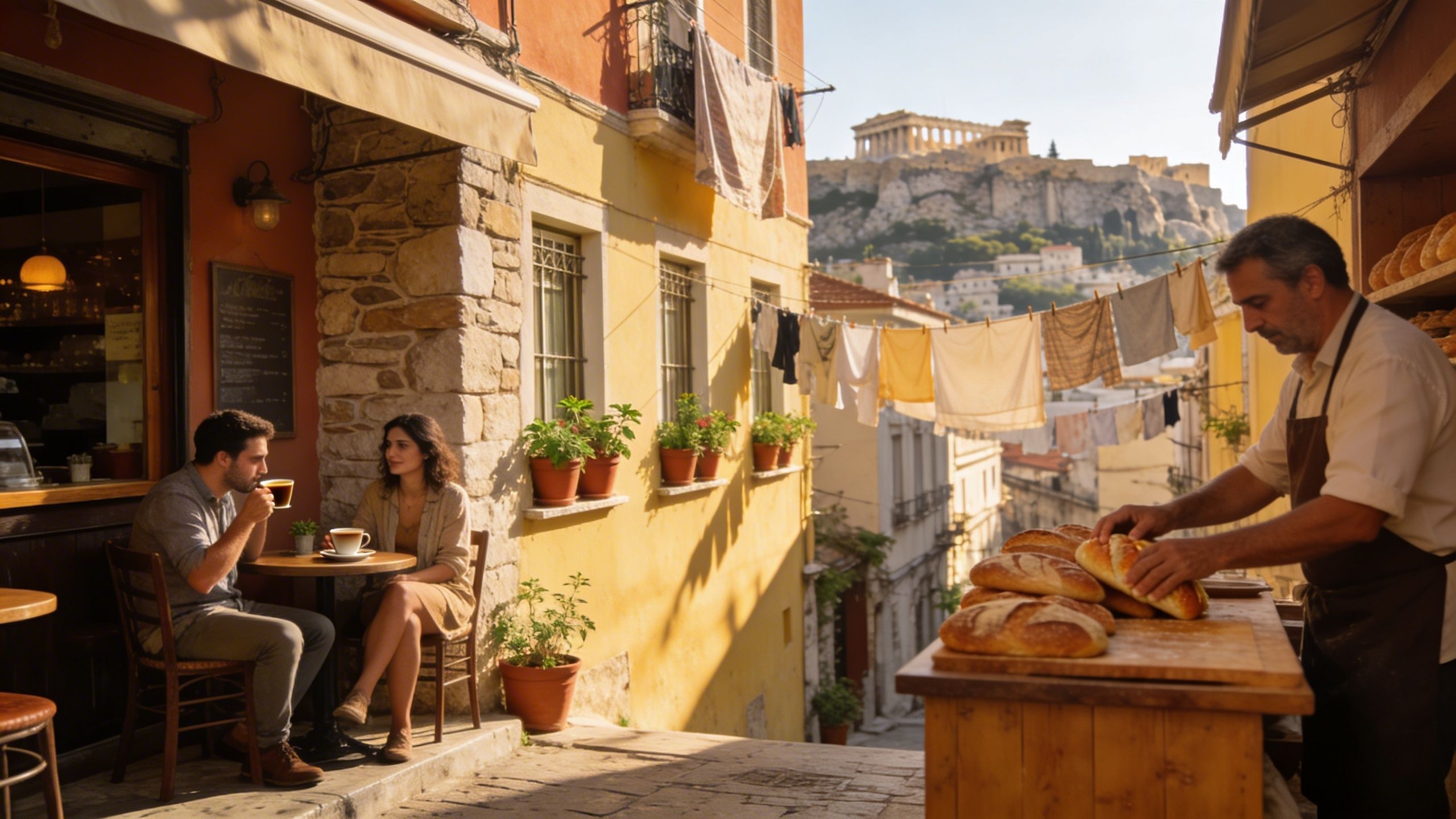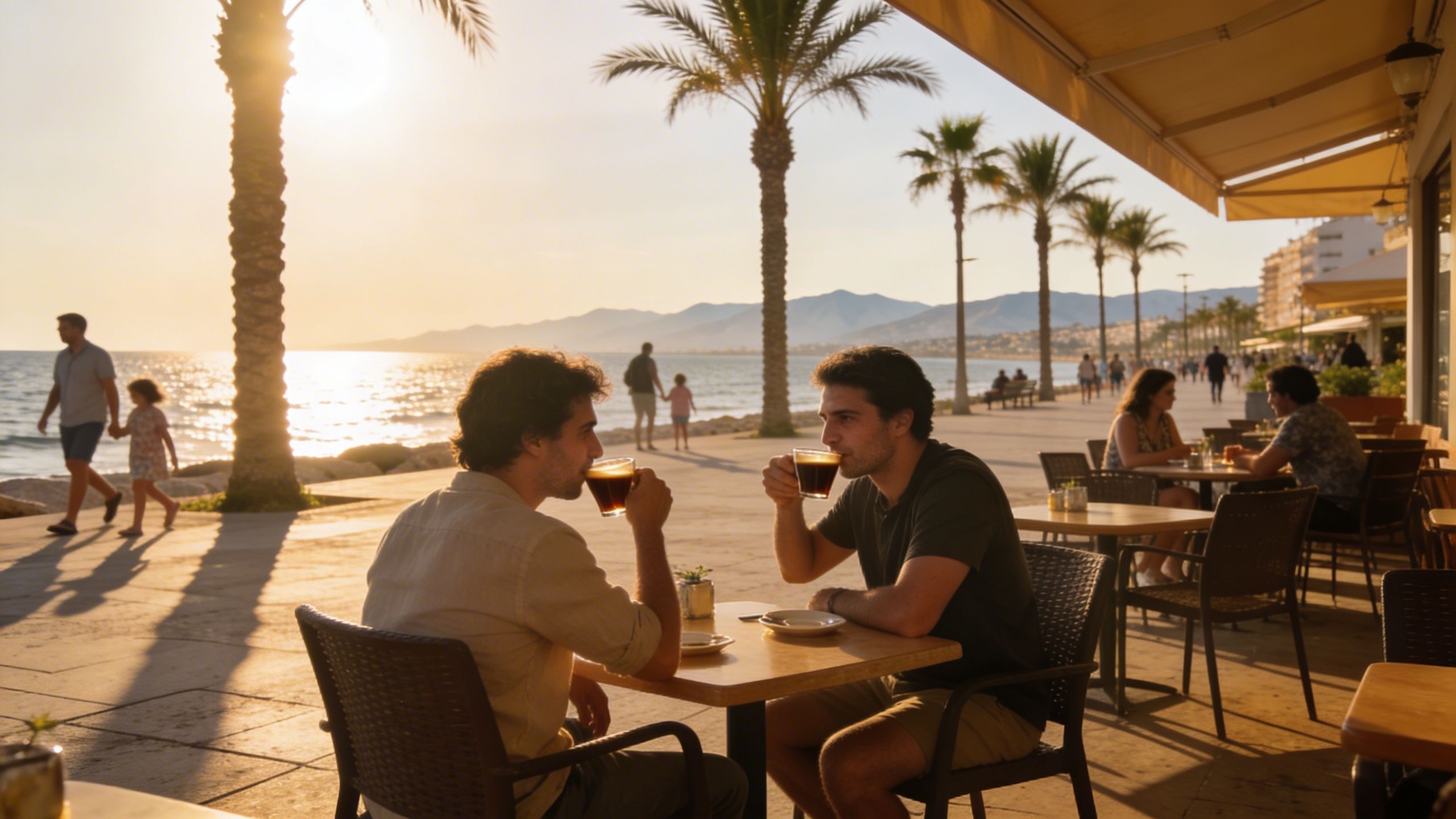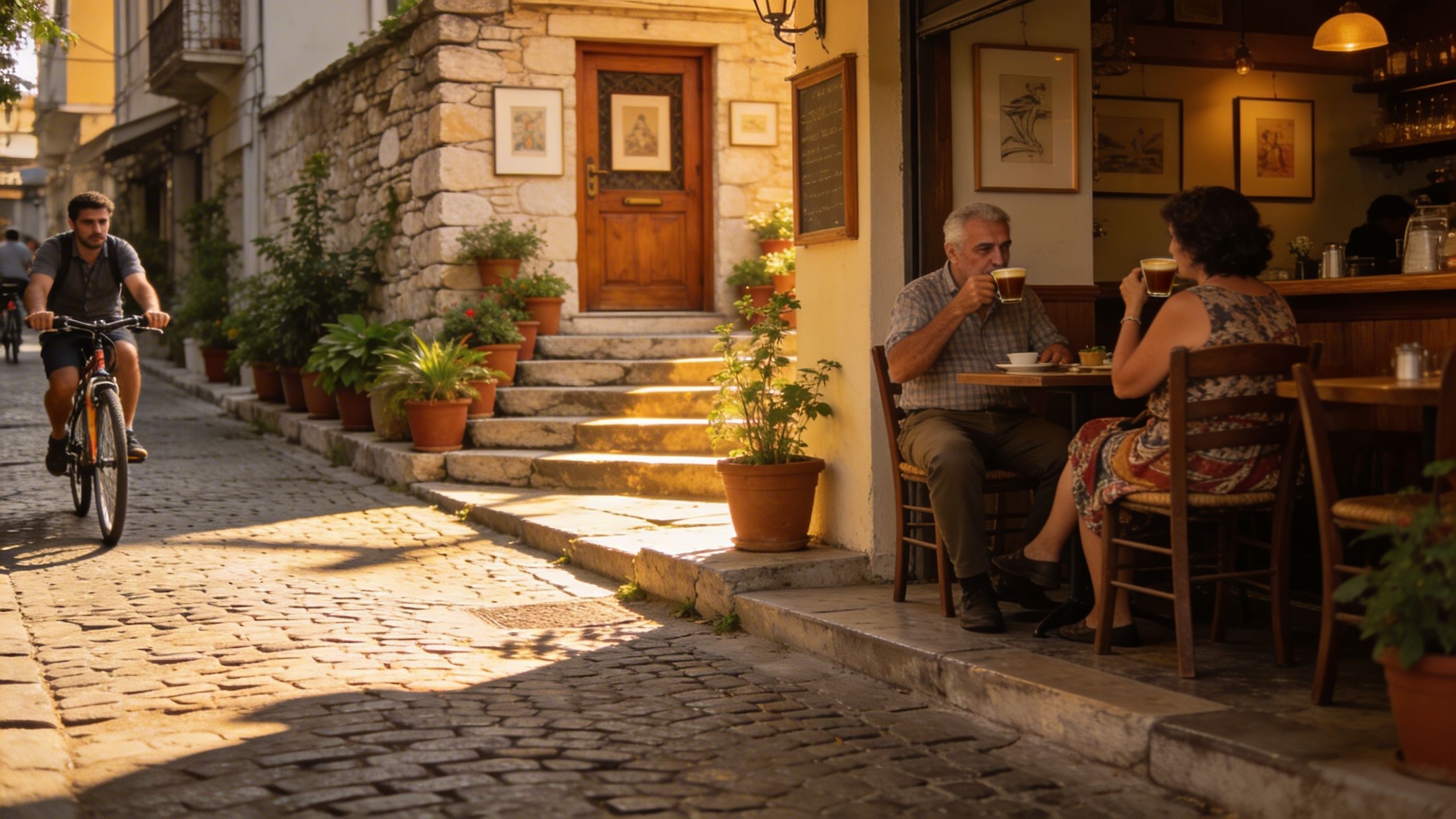Close with Care: Greece’s Lifestyle‑First Closing Playbook
Fall in love with Greece’s market mornings and terrace light, while closing with checks that protect both lifestyle and long‑term stewardship. Practical steps and local data included.
Imagine waking before dawn to the clatter of a morning market in Koukaki, the smell of strong Greek coffee mixing with sea salt carried from the Acropolis-facing breeze. Picture late afternoons on a shaded terrace in Plaka, neighbors exchanging tomatoes from rooftop gardens while cicadas hum, or quiet winter walks along Nafplio’s Venetian quay when the tourist crowds have melted away. Greece is not a single mood but a collection of micro-seasons and intimate neighborhoods where food, light and ritual shape each day. That sensory life is what you’re buying into — and it matters for negotiation, closing and the long stewardship of a home here.
Living the Greece life: light, market mornings and sea-salted afternoons
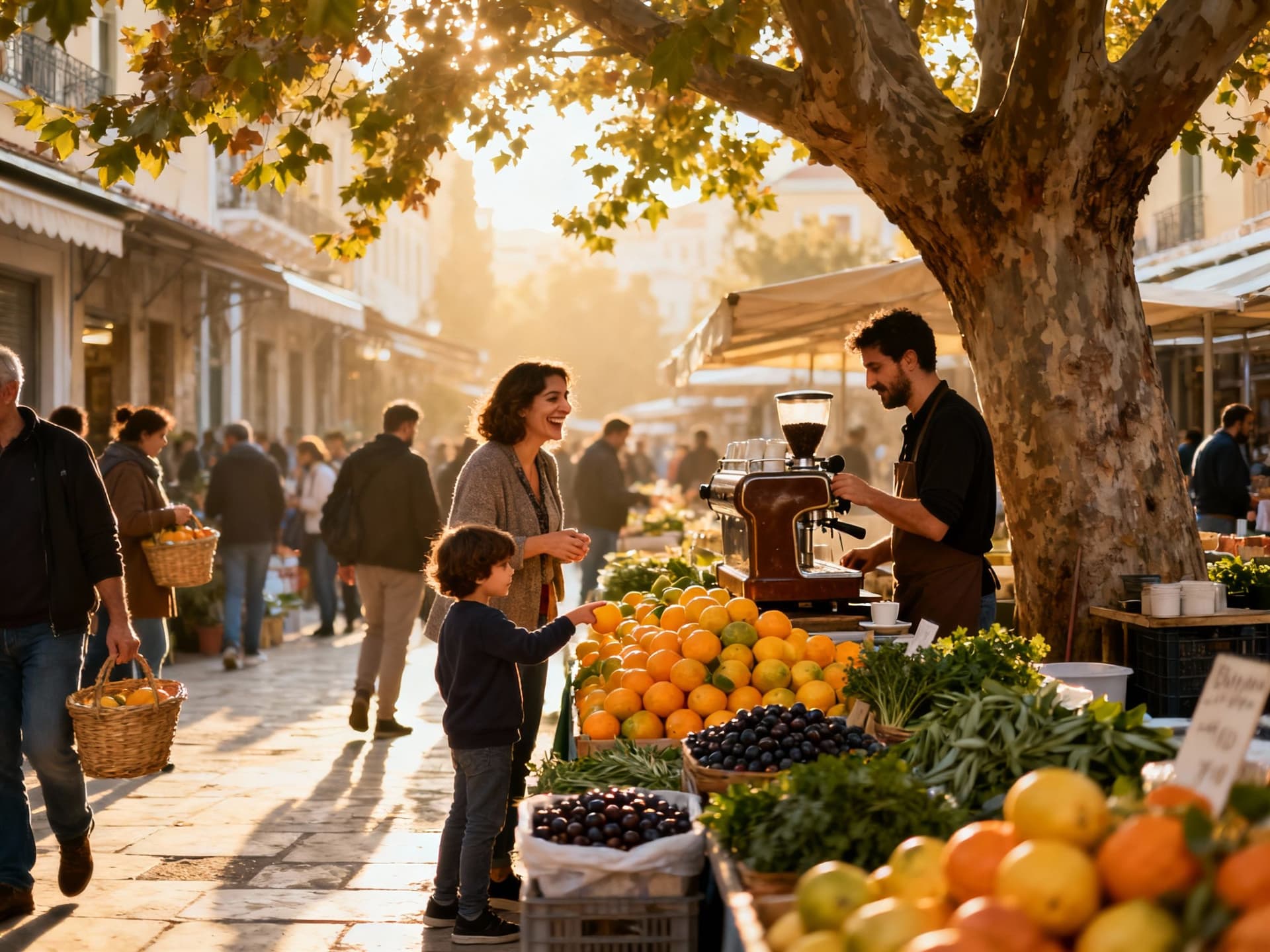
There’s a rhythm to Greek living that shifts from island to city. In Athens, afternoons tilt toward espresso and conversation on tree-lined streets in Kolonaki or Exarcheia; on the islands like Paros or Syros, life is sculpted by sea and wind, with harborside tavernas that pulse after sundown. Even small villages have weekly market days that function as both grocery run and social theatre. For buyers, understanding those daily rhythms helps decide whether you want a pied-à-terre near a café or a quiet stone house that leans into seasonal solitude.
Neighborhood spotlight — Athens: Koukaki, Plaka and Pagrati
Koukaki offers narrow streets, neighborhood tavernas and a surprising number of restored neoclassical buildings that suit restoration-minded buyers. Plaka sits under the Acropolis — tourist-heavy but alive with artisan shops and morning light that floods old stone courtyards. Pagrati, a short walk from the city centre, is where locals buy bread and linger in cafés; it’s quietly popular with expats who want lived-in authenticity rather than glossy spectacle. Each of these areas rewards a different lifestyle, and that choice should shape both negotiation strategy and long-term stewardship plans.
Food, markets and the island slow-cook
A day in Greece often begins at market stalls — the fishmonger, the woman selling thyme honey, the farmer with fragrant herbs. Islands like Crete or Naxos have world-class local produce that changes menus and the way gardens are designed around houses. For buyers wanting a home that supports a farm-to-table life, look for properties with south-facing terraces, water access, or nearby local cooperatives. Those lifestyle features also factor into negotiations: a productive plot or permitted kitchen garden can add measurable lifestyle value that savvy sellers sometimes overlook.
Lifestyle highlights to scout in person
Morning market in Varvakios (Athens) or the Chania Agora — daily food rituals
Rooftop terraces with pergolas and rainwater tanks — practical Mediterranean living
Seaside promenades in Nafplio and Pylos — winter light and low-season charm
Local cafés where expats and locals mix: Little Kook (Athens-style theme cafés) vs. neighborhood kafeneio
Making the move: practical considerations that protect the lifestyle
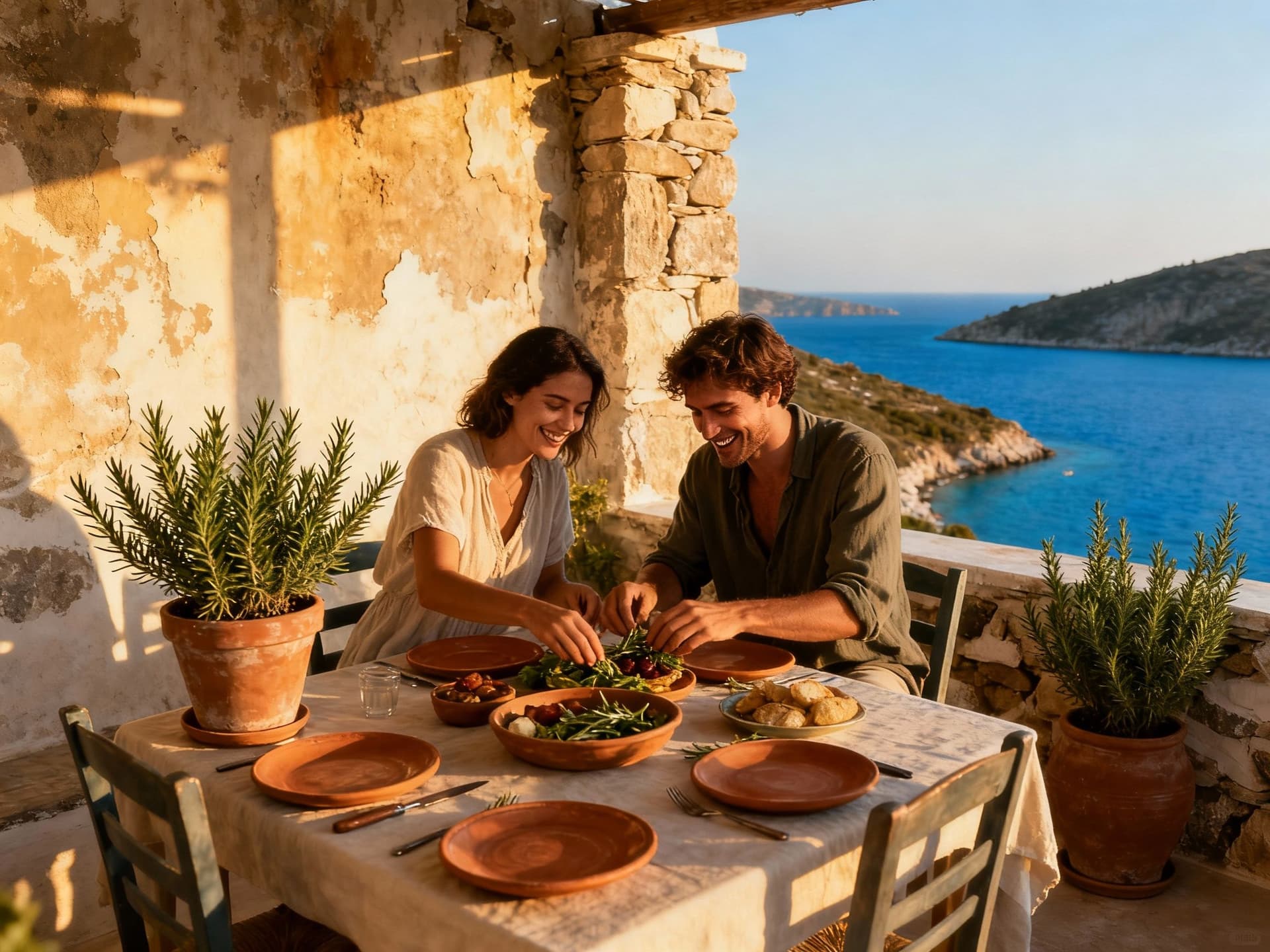
Living here is the dream; closing cleanly preserves it. Greece’s house price index has risen in recent quarters, reflecting stronger demand in both Athens and popular islands — a reminder that timing and local market data should shape offers, not just heart. You’ll want to pair lifestyle must-haves (terraces, water access, old-stone character) with practical checks: permitted building status, recent seismic reinforcements, and clear registry records. Those are the items that turn a beautiful purchase into a sustainable one.
Property types & how they fit your days
A Cycladic stone house offers thermal mass and cool interiors in high summer but often needs modern insulation upgrades for comfortable winter use. New builds may include solar-ready roofs and greywater systems, reducing running costs and stewarding local water resources — attractive for buyers prioritising low-impact living. If you love communal life and late-night cafes, opt for a compact apartment in a central neighborhood; if solitude and garden-grown produce matter, look for a village property with fertile terraces and good sun exposure.
Work with experts who know both lifestyle and logistics. Greek transfer tax is typically levied at 3% on the property’s taxable value, and ownership brings annual ENFIA obligations that vary by location and size. A local lawyer and a sustainability-minded architect can spot whether an older home can be retrofitted with photovoltaics, rainwater capture, or passive cooling — upgrades that improve comfort and can provide negotiating leverage. Your team should include a notary and registry specialist who understand local municipal codes and any island-specific constraints.
Steps to close with lifestyle & stewardship in mind
Hire a bilingual local lawyer to run title searches, check encumbrances and confirm permitted uses before you make an offer.
Commission a structural and seismic survey — older stone homes often need reinforcement, and this should inform your offer and renovation budget.
Request recent utility bills and ENFIA statements to understand ongoing costs and whether investments like solar will pay back.
Negotiate repair credits or a phased closing that ties final payment to completion of agreed upgrades (e.g., permits for an added soakaway or PV installation).
Insider knowledge: expat realities and stewardship surprises
Expats often tell the same two stories: the delight of being invited into neighborhood life, and the surprise of paperwork complexity. Buying in Greece is straightforward if you have local advisors, but there are quirks — for example, new-build VAT rules can affect whether transfer tax applies, and municipality practices differ across islands. Stewardship here means thinking seasonally: who will tend the garden in August, how will a property breathe in winter, and can a property be made more self-reliant for water and energy?
Cultural integration, language and neighbourhood life
Greek social life favors small acts of neighborliness: a plate of food left at your door, an invitation to a village festival, casual conversation at the bakery. Learning a few phrases and attending local events opens doors faster than any glossy brochure. Many expats join local volunteering groups, cultural associations or co-ops; these connections are practical too, helping with caretaking, repairs and trusted tradespeople when you’re not on site.
Long-term stewardship — making the house sustainable and local
Think beyond the sale: plant native Mediterranean species to reduce irrigation needs, add cisterns for rain capture, and consider heat pumps or solar thermal for year-round comfort. These are not just ‘eco’ choices — they lower bills, reduce maintenance headaches, and keep your home in conversation with local ecology. When negotiating, request documentation of any recent works and ask sellers about seasonal issues such as water shortages or winter exposure to northerly winds.
Red flags and stewardship checks to include in your offer
No title insurance or incomplete registry entries — insist on clean title before deposit.
Missing seismic reinforcement documentation for older stone properties — budget for engineers.
Unpermitted extensions or gardens without water rights — these can be costly to regularise.
Seasonal accessibility problems (narrow ferry timetables, winter roads) that affect caretaking and rental potential.
If you want help matching lifestyle and legal certainty, a local, sustainability-aware agency can curate options that already meet green priorities and community integration. Start with small, practical asks during viewing: can the seller provide last three years of utility bills, is there a documented history of pests or flooding, and are there neighbours who can vouch for seasonal conditions? These simple checks feed directly into stronger negotiation positions.
The Mediterranean light that makes Greece so seductive shines on practicalities too. Buying here is as much about committing to a seasonal life — market rhythms, village festivals, the gardening calendar — as it is about bricks and legal forms. Close with care: build a local team, budget thoughtfully for stewardship, and negotiate terms that protect both the home’s character and your ability to live gently within its landscape. Then you’ll own more than a house; you’ll have bought into a way of life.
Dutch property strategist who helped 200+ families find sustainable homes in southern Europe; expert in legal pathways and long-term stewardship.
